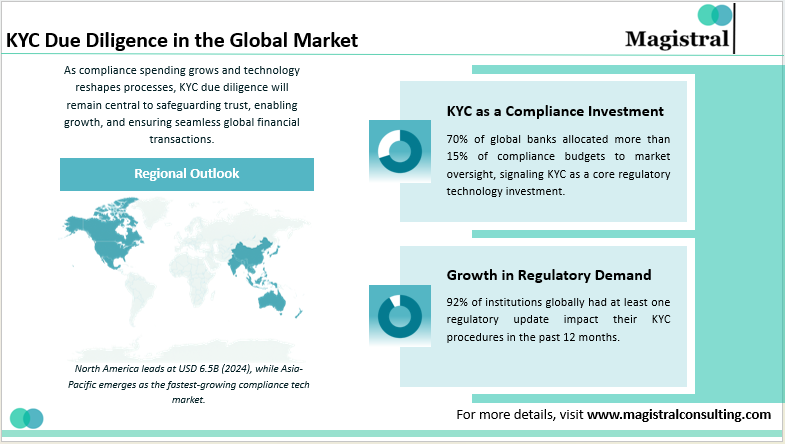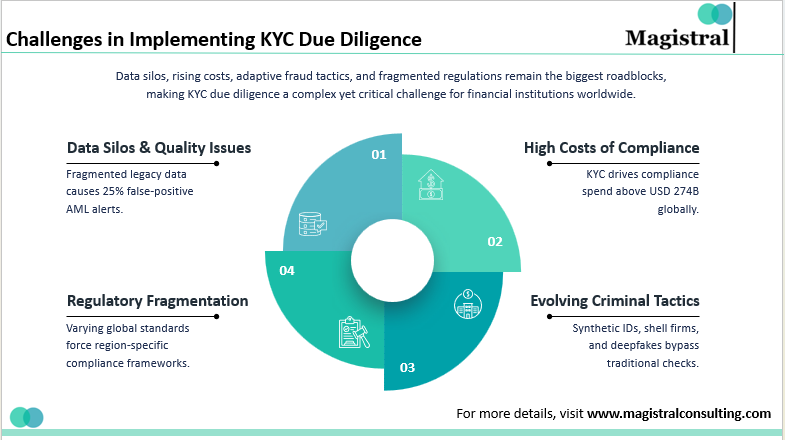In today’s active financial environment, regulators and investors are supervising institutions on an ongoing basis. Accountable measures such as transparency, anti-fraud measures, and verifying the identity of applicants are imperative to ensure the market and other participants have confidence. This is the very essence of KYC due diligence. It supports financial institutions in minimizing the risk of money laundering and possible reputational harm associated with the financing of terrorist activities through the application of identity verification, risk profiling, and ongoing monitoring. Deloitte’s survey in 2024 found that 70% of global banks allocated more than 15% of their compliance budget to market oversight, which meant KYC investments were an investment in real regulatory technology, committed to the process of reporting under KYC as it expanded.
KYC Due Diligence in the Global Market
With cross-border capital flows being rather common and digital banking along with fintech being adopted speedily, the relevance of KYC due diligence has taken a sharp upsurge.

KYC Due Diligence in the Global Market
Growth in Regulatory Demand
Financial Action Task Force FATF guidelines and region-specific regulations slightly intensified the compliance burden. E.g., through AMLD6 in the EU, or the Bank Secrecy Act in the US. According to PwC, in the year 2024, 92% of institutions at a global level have had at least one regulatory update. It had some effect on their KYC procedures in the last 12 months.
Rise of Technology in Compliance
One of how technology has been changing the concept of legal compliance is by integrating AI. For instance, AI in portfolio management is being used to facilitate the extraction of data. Similarly, AI in KYC allows automatic risk scoring, sanction list screening, and real-time alerting. According to another report from McKinsey in 2025, automation cut manual times in half and improved suspicious transaction detection by about 40%.
Regional Outlook
North America stands tall in the compliance tech market, having a valuation of almost USD 6.5 billion in 2024. Meanwhile, the Asia-Pacific region is the fastest-growing due to the fast fintech penetration. It is also the respective governments’ efforts in establishing digital identity programs in India and Singapore.
The Process of KYC Due Diligence
A systematic method supports compliance and efficiency.
Customer Identification Program (CIP)
At the foundation is CIP, which involves the institution validating government-issued documentation, digital IDs, or biometric data. For private equity and venture capital, the process of onboarding is thorough to ensure that investments are only going to legitimate entities.
Customer Risk Profiling
Banks and funds often create a risk rating system based on geography, transaction volume, and business type. Higher-risk clients, including politically exposed persons (PEPs), undergo enhanced due diligence (EDD). This process can be especially important for institutions that fundraise capital from investors. They also need to protect themselves from reputational risk when vetting those investors.
Ongoing Monitoring
KYC should not be viewed as a “one and done” process. There are advanced AI-powered deal origination tools that facilitate granular ongoing monitoring of unusual trading patterns, ownership changes, and flags to lists of individuals sanctioned. This real-time monitoring is an absolute necessity for continual fraud detection, which is a necessity in this rapid fraud-response environment.
Record Keeping and Reporting
Regulators demand an audit trail that is rich and robust. By building out compliance intrapartum, firms ensure that they can track every single transaction and ID check in one common record and be immediately available to create a report.
Best Practices for Effective KYC Due Diligence
An effective approach is a balance of technology, risk awareness, collaboration, and client centricity. Organizations that adopt these practices do so not only to comply with regulations but to enhance operational efficiency while protecting brand reputation.
Adopt AI and Automation
Legacy KYC practices are manual, slow, and prone to human error. AI and automation allow organizations to streamline verification processes, improve customer onboarding and reduce costs. There are now tools to conduct sanction screening in real-time, identify anomalies and conduct deep fake checks. Overall, these tools can dramatically reduce manual review times by at least 50%, all while improving the accuracy of fraud detection.
Implement Risk-Based Policies
Not all clients are at equal risk. Risk-based policies allow institutions to apply their resources to the most critical areas. Risk-based policies allow institutions to provide basic client checks for low-risk clients and apply an enhanced due diligence approach for higher-risk clients, such as PEPs.
Strengthen Data Governance
Fragmented or low-quality data is one of the greatest KYC challenges institutions face, resulting in prolonged onboarding, excess false positives, and compliance risk. Strong data governance coupled with data normalization will reduce erroneous data, increase transparency and strengthen the audit trail while supporting future scalability.
Leverage Cross-Institution Collaboration
Shared KYC utilities reduce duplication of effort in the onboarding process by allowing institutions to rely on a verified client profile from either directly or participating institutions.
Ensure Continuous Monitoring
KYC is a process that’s continuous in nature, not a one-off assessment. AI’s continuous monitoring audits every transaction, monitors ownership changes, and detects anomalies as they happen; it also assesses risks earlier, adapts quickly to new risks, and keeps compliance at the forefront.
Challenges in Implementing KYC Due Diligence
Despite improvements made, institutions still face challenges in implementing it.

Challenges in Implementing KYC Due Diligence
Data Silos and Quality Issues
Global banks typically have fragmented client data that is dispersed in legacy systems. A 2024 PwC study showed that poor data quality was responsible for producing 25% of false-positive AML screening results, which wasted time and money.
High Costs of Compliance
As reported by LexisNexis, in 2024, financial institutions around the world spent more than USD 274 billion in compliance costs, with KYC being the most expensive compliance expense. Smaller funds and startups are particularly struggling with high, rising costs, and usually employ an outsourced service.
Evolving Criminal Tactics
Criminal actors use synthetic identities, shell companies, and deepfake technology to circumvent traditional KYC verification. This has facilitated the use of KYC platforms for institutions using AI.
Regulatory Fragmentation
As there are vastly different standards from different jurisdictions, multinational institutions must create compliance processes that are custom to the region.
Future of KYC Due Diligence
The upcoming decade will manifest a better way for businesses to manage compliance.
Technology-Led Transformation
Blockchain is leading to verifiable and secure KYC registries that help to eliminate duplication of checks across institutions. At the same time, organizations are leveraging AI technology to increase data accuracy and speed in the compliance process for onboarding and real-time monitoring for suspicious transactions.
Personalization and Risk-Based Approaches
Regulators have started to encourage risk-based checks in place of blanket checks, relative to a client profile. This design makes compliance more efficient but ultimately decreases friction for lower-risk clients and allows for greater scrutiny for higher-risk profiles.
Collaborative Ecosystems
Discussions around shared KYC utilities that allow a group of banks to access a verified customer profile remain pertinent. This sort of collaboration helps reduce costs for the banks and customers. These shared utilities may, over time, evolve into digital identity solutions that integrate biometrics and regulatory frameworks. It is to maximize a better customer experience and ensure some consistency across borders. Maintaining a compliance and risk-based approach to managing data will be crucial as RegTech solutions evolve. Organisations will also centralise data, and privacy concerns dictate the direction of KYC solutions.
About Magistral Consulting
Magistral Consulting has helped multiple funds and companies in outsourcing operations activities. It has service offerings for Private Equity, Venture Capital, Family Offices, Investment Banks, Asset Managers, Hedge Funds, Financial Consultants, Real Estate, REITs, RE funds, Corporates, and Portfolio companies. Its functional expertise is around Deal origination, Deal Execution, Due Diligence, Financial Modelling, Portfolio Management, and Equity Research
For setting up an appointment with a Magistral representative visit www.magistralconsulting.com/contact
About the Author

Prabhash Choudhary is the CEO of Magistral Consulting. He is a Stanford Seed alumnus and mechanical engineer with 20 + years’ leadership at Fortune 500 firms- Accenture Strategy, Deloitte, News Corp, and S&P Global. At Magistral Consulting, he directs global operations and has delivered over $3.5 billion in client impact across finance, research, analytics, and outsourcing. His expertise spans management consulting, investment and strategic research, and operational excellence for 1,200 + clients worldwide
FAQs
What is the difference between KYC and due diligence?
Why is KYC due diligence critical in investment banking?
How does technology enhance KYC due diligence?
What industries need KYC due diligence the most?
Can small firms afford KYC due diligence systems?